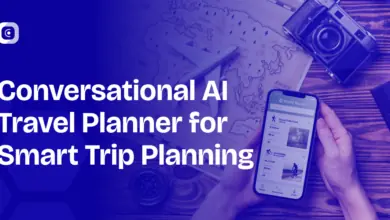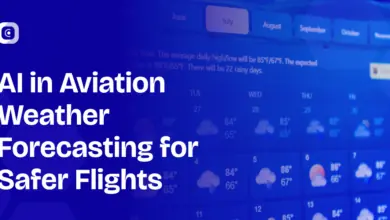Agentic AI in Travel Operations: The Future of Autonomous Travel Systems
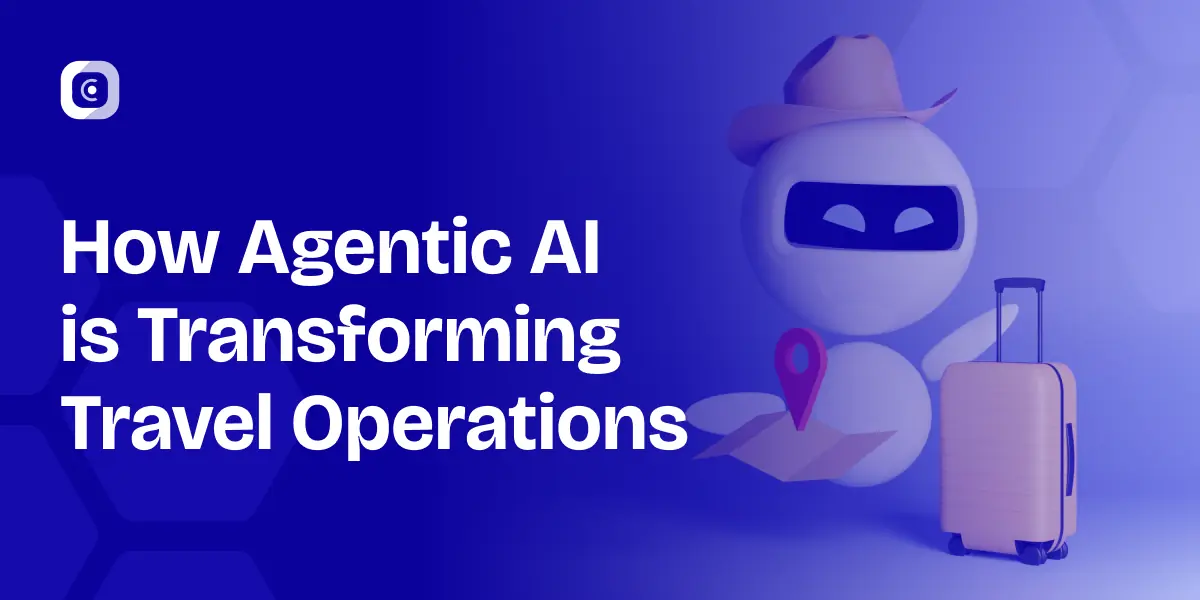
Travel systems worldwide have always been ready for innovation. With the introduction of online booking systems and chatbots, the pioneering changes brought about digital automation. But the latest changes focus on providing autonomy. With the introduction of Agentic AI in travel operations, we have systems capable of decision-making and taking action on their own. These AI systems are no longer merely responding to instructions provided to them; they are learning, adapting, and optimizing travel processes in real-time.
Unlike traditional travel AI which focuses on automating individual tasks like booking, pricing, and customer service, agentic AI in the travel industry goes above and beyond. These fully autonomous AI agents touch multiple levels of data, assess various conditions, and complete intricate, multi-step tasks without needing a human to guide them. Such self-organizing, self-optimizing travel ecosystems are built to optimize business operations and the traveler’s journey.
Now, let’s look at the major features of agentic AI for travel planning, its current applications in the travel sector, and the remarkable possibilities it offers in the future.
What is Agentic AI?
Agentic AI refers to systems that can independently take action, perceive their surroundings, and make decisions. In contrast to the artificial intelligence in travel industry, which executes predefined commands and rules, agentic AI assesses a situation, makes a choice, and takes action without assistance.
In travel, agentic AI makes it possible for systems to perform intricate tasks, including:
- Creating itineraries that take availability, preferences, and travel restrictions into account in real-time.
- Keeping track of the weather, flight delays, and geopolitical factors.
- Changing travel plans without user input, like rebooking flights, hotels, or airport transfers, in real-time.
- Providing real-time travel updates using AI to travelers.
An example of autonomous AI agent in tourism sector is managing and overseeing all factors of travel:
- Booking flights based on user preferences and availability.
- Managing accommodation bookings.
- Monitoring and managing itinerary delays or disruptions in real time
- Thereby, updating travel schedules in real-time and notifying changes to travelers.
Agentic AI in travel and automated troubleshoot systems help travel organizations shift their functioning from a reactive approach to actively anticipating and solving problems.
Why Travel Operations Need Agentic AI
There are multiple components of the travel industry. Complex and versatile interconnected systems contribute to the delay of the industry. Each and every operation from airlines to OTAs to hotels to even transport on the ground to tourism boards works on their own isolated systems. Lack of cohesion and close unaligned systems can create paradoxes and operative issues and communication busts. Yet even with the phased agentic AI technology, there are breakthroughs to improve systemic cohesion.
a. Rising Traveler Expectations
Travelers today expect more than just a process of booking tickets. And they expect hyper-personalized experiences, real-time updates and consistent service across all touchpoints. Conventional AI in travel industry type solutions in chatbots and recommendation engines can support simple requests, but lack the ability to make pro-active decisions. Travelers will increasingly demand smart systems that anticipate their needs, fix problems in real time and get smarter as they learn from past interactions. So such situations are ideal for agentic AI. By analyzing numerous data inputs such as historical travel data, current weather patterns and information on events happening as you go from Point A to Point B, it can predict disruptions, deliver a personal experience or even automatically rebook your trip before a human ever has time to get involved.
b. Complex Operational Networks
One trip may involve multiple touchpoints with different service providers for flights, transfers, accommodations and insurance. Manually scheduling these services is no easy feat, especially when one considers external factors such as weather delays, traffic or the preferences of the customer. Agentic AI removes the need for this manual coordination, automating complex tasks to provide a smooth experience for customers and businesses. AI automation in travel can be used to develop agentic systems which may bridge system gaps resulting into intelligent single workflow that covers entire journey from booking till end.
c. Business Efficiency and Scalability
The most important benefit that agentic AI can bring to travel operations is the ability to automate tasks traditionally performed by human agents. Manual processes like rebooking flights or changing flight schedules by hand is a lot of work, and the process can be prone to error. Through the incorporation of autonomous systems, companies can achieve significant reduction of operational costs and increased productivity in every area. Consider an AI-powered agentic AI travel booking system. Such a system identifies the most suitable flights, hotels, and car rentals, books them in real time, and autonomously manages all the subsequent tasks, including confirming them and making payments.
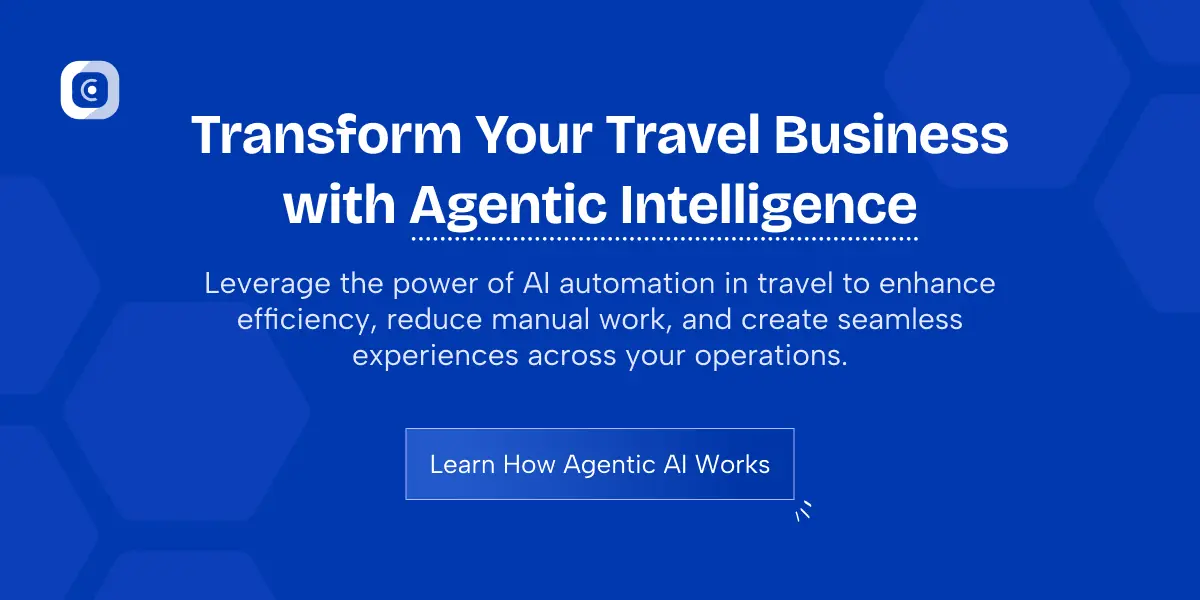
d. Resilience and Risk Management
The travel sector faces multiple disruptions such as weather delays, natural calamities, and geopolitical occurrences which tend to affect thousands of passengers and pose serious operational challenges. Outdated systems, in most cases, respond slowly to changes, which in most cases lead to customer dissatisfaction and disorganized operations. The agentic AI systems, in contrast, evaluate and predict factors in real time, estimating and averting most risks before they happen. For instance, when a flight is delayed, agentic AI in travel planning automatically rebook the customer onto the next available flight, inform the user of the flight changes, and adjust local transport accordingly. Predictive AI performs the tasks of the customer and the businesses.
e. Sustainable and Data-Driven Travel
The travel industry’s focus on sustainability is becoming increasingly pronounced as customers turn toward eco-friendly choices. By automating, agentic AI travel systems can also help businesses eliminate waste and maximize resource allocation including minimizing the overbooking of seats to smart route planning for fuel efficient travel. And predictive analytics can also be used by these systems to estimate demand and tailor operations accordingly, avoiding unnecessary travel and carbon emissions.
Key Use Cases of Agentic AI in Travel Operations
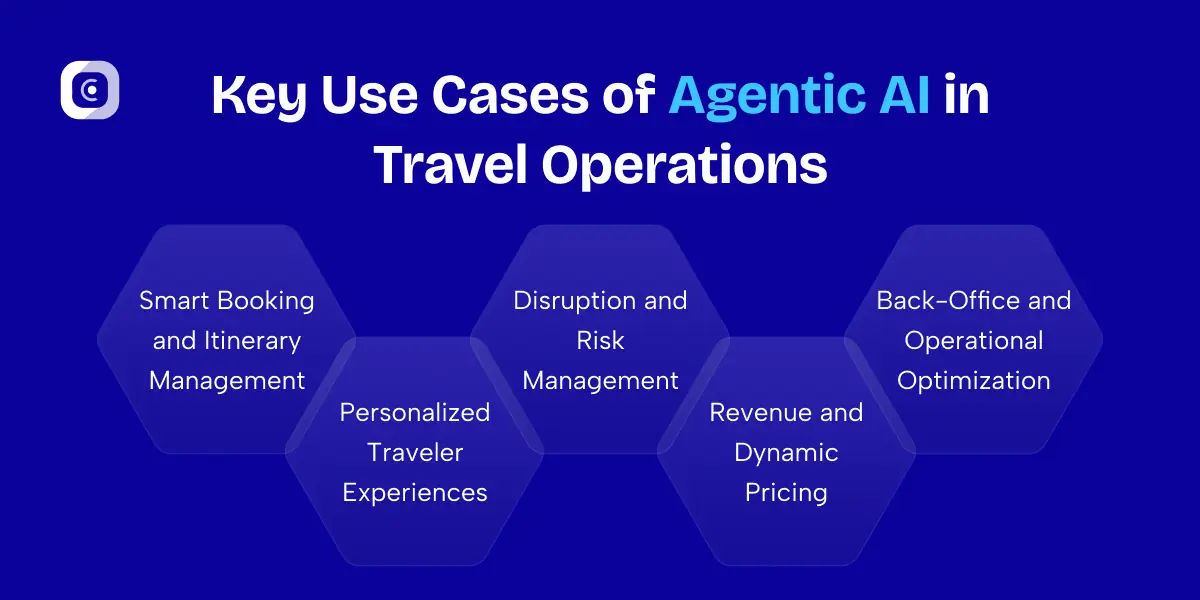
Intelligent Booking and Itinerary Management
Agentic AI travel booking systems take a unique approach unlike any other. Compared to traditional systems, which only provide recommendations based on simple pre-programmed constraints, agentic AI systems employ a multi-layered approach based on:
- Traveler parameters (for example, budgets, seat preferences, travel date, etc.).
- Real-time data (for example, availability, pricing, weather, etc.).
- Behavior pattern (for example, previous trips, preference ratings, etc.).
Agentic AI systems are advanced enough to autonomously book a complete itinerary, as well as adapt to changing live parameters. For example, if a flight gets delayed, the program automatically clocks the rest of the trip and adjusts hotel check-in times and car rentals, even meal arrangements, and notifies the traveler of every change. Travel businesses can appreciate the automated process as it minimizes manual intervention necessary to achieve a desired outcome, thereby cutting costs and improving customer satisfaction.
Disruption and Risk Management
Within the travel industry, there are many disruptions, and there are no possible ways to avoid them, which include flight delays, natural disasters, or unforeseen political situations. Predicting and handling potential disruptions using agentic AI in travel operations will help avoid and minimize the impact of situations with speed and efficiency. Autonomous AI agents in tourism can identify and act upon potential disruptions with the help of predictive algorithms which analyze real-time data and global geopolitics.
Back-Office and Operational Optimization
In the optimization of operational efficiencies, the hidden use of AI automation in the travel industry is significant. From operational automation in airlines with crew placement and fuel management to inventory forecasting and staffing scheduling in hotels, agentic AI is transforming back-office capabilities and allowing organizations to automate operational efficiencies. For hotels, agentic AI use case scenarios for predicting occupancy and staffing alignment forecasting are quite advanced. In the same way, agentic AI applications in the airlines for scheduling optimization of ground handling resources improve operational efficiencies. Such enhancements at the backend of operational systems in the customer service supply chain enable clients in this industry to focus customer service attention, with lower operational costs.
Personalized Traveler Experiences
Personalization has always been a goal for AI in the travel sector. So, agentic AI goes a step further, learning user behavior and anticipating needs to tailor experiences in an individual and profound manner.
Traveler expectations are the primary driver of this shift.
An August 2025 Mews survey found that 68% of travelers would rather receive personalized offers from a hotel than loyalty program benefits, a figure that rises to 83% among Gen Z. Furthermore, 93% are willing to share personal information in exchange for more tailored experiences underscoring the growing importance of personalization in modern travel.
Consider, for example, an agentic AI-powered autonomous travel concierge. If a traveler has a preference for certain types of hotel rooms or certain activities, the AI will remember these and make suggestions. If a traveler enjoys taking the scenic routes, the AI will prioritize those, even if they are longer, and adjust the travel itinerary accordingly. Furthermore, agentic AI travel can predict what a traveler wants even before they voice it. For example, it can offer a room upgrade based on previous stays or alert travelers to a flight change in advance of their planned travel.
Revenue and Dynamic Pricing
In the travel world, agentic AI is reinventing the way revenues are managed. Agentic AI travel systems can track demand, competition and seasonality to automatically optimize pricing in real-time.
For instance, when demand is high, the system might up the prices for flight tickets or hotel rooms to maximize revenue. In slow times, it can provide discounts or offer promotions in order to draw more customers. The AI dynamically updates these prices, enabling companies to maximize revenue without losing their potential customers.
Implementation Roadmap for Agentic AI Adoption
Adoption of Agentic AI in travel operations requires strategic preparation. Businesses should evaluate their states of readiness, build robust data ecosystems, and confirm that systems are ready for integration.
A McKinsey & Company report indicates an increase in AI adoption in the travel industry from 4% in 2022 to 35% in 2024. Despite 59% of travel companies experiencing productivity improvements from AI initiatives, only 2% of travel companies have deployed agentic AI at scale, which further illustrates why readiness assessment is the first and most important step. Most companies are still in the construction phase of moving from basic automation to full autonomy.
Guide for Agentic AI Implementation
Step 1: Assess AI Readiness
Before you implement agentic AI, it is crucial to audit your systems. Assessing existing sources of data, API integrations, and level of maturity of your AI in travel industry capabilities. Are your existing systems prepared to scale to agentic AI?
Step 2: Create a Unified Data Layer
Data is central to the vision of agentic AI. Bring in all relevant data together e.g., customer data, flight bookings, schedules, weather patterns and so on. A unified data layer allows AI systems to reason and act accurately.
Step 3: APIs and Legacy Systems Integration
The problem is that most travel companies still run on outdated systems. For AI automation to work for travel companies, they must connect agentic systems with the infrastructure that already exists. With middleware, or if there are open APIs, data can flow easily between the old and new systems.
Step 4: Pilot a Single Agentic Workflow
Begin practicing small by automating one of your most important workflows, like rebooking or flight notifications. Monitor performance, gather user feedback and improve before scaling.
Step 5: Ensure Human Oversight
While agentic AI for travel planning operates without intervention, businesses must guarantee human oversight for AI actions to align with customer expectations and regulation.
Step 6: Expand and Scale
After successful early workflows, expand AI’s role into customer service, pricing and other travel operations. Gradually scale into a wider multi-agent environment in which all agents handle complete aspects of the travel journey.
Benefits and ROI of Agentic AI in Travel Operations
Agentic AI in the travel industry offers many advantages, from improved customer experiences to greater operational efficiencies. Here are the primary advantages:
Operational Efficiency
- Reduced manual intervention by 60–70%.
- Less booking errors due to real-time data validation.
- AI automation in travel boosts productivity.
Customer Experience
- AI-based travel updates in real time keep travelers updated throughout the trip.
- Repeat bookings can be boosted by 1 in every 4 customers through personalized recommendations.
Cost Reduction
- Savings on rebooking and compensation.
- AI-powered predictive maintenance cuts airline downtime.
Revenue Growth
- Agentic AI increases profitability through dynamic pricing.
- New revenue is generated through personalized package upsells.
Key Features of Agentic AI in Travel Operations
Autonomy and Decision-Making
- Agentic AI in travel operations isn’t waiting for human intervention constantly. It acts independently, like changing schedules or rebooking flights.
Context Awareness and Multi-Step Reasoning
- Agentic AI systems recognize context and can perform multi-step actions such as rebooking, updating itineraries, and informing customers all at once.
Real-Time Adaptability
- Travel updates with agentic AI are instant, which means that it can adapt the travel plans quickly to any changes in a traveler’s schedule.
Collaborative Multi-Agent Ecosystems
- Various agents can collaborate to manage different parts of the journey. This goes from booking to logistical transport to provide a seamless travel experience.
Learning and Optimization
- With each interaction, agentic AI for travel planning grows smarter along the way, continuously learning traveler preference and operation optimization.
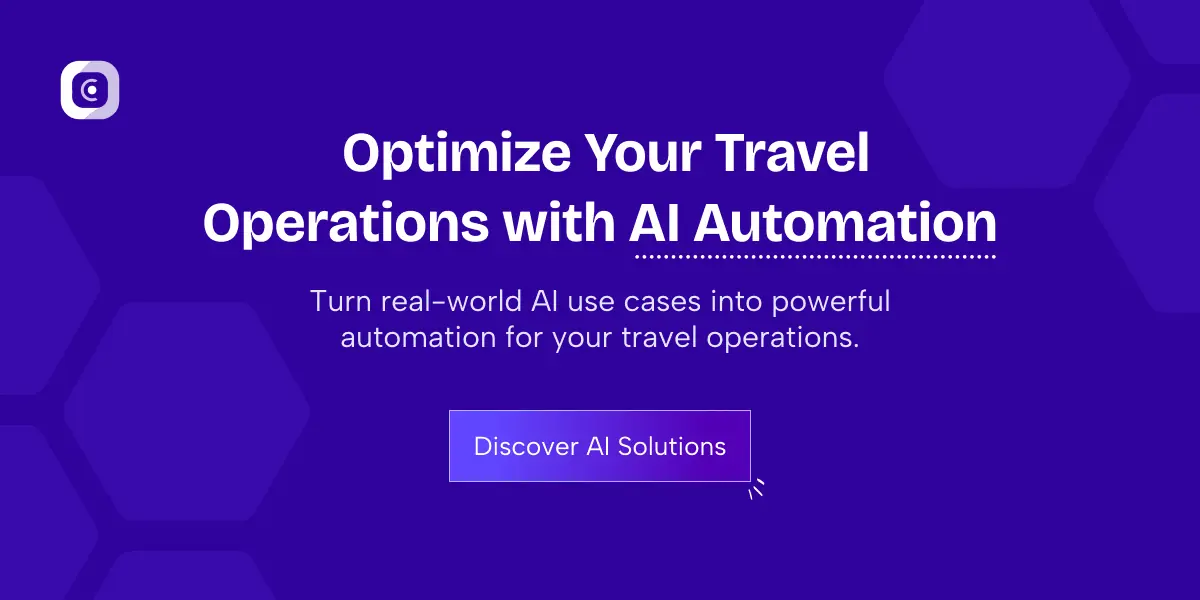
How Agentic AI is Transforming Flights and Hotels
Agentic AI’s influence on travel is clearest in two major sectors i.e., Flights and Hotels which have highly complex and inter-linked workflows, real-time updates, and elevated expectations from clients, making these sectors ideal candidates for agentic AI in travel.
Through autonomous flight booking, intelligent rebooking, personalized hotel management, as well as dynamic pricing; Agentic AI brings us one step closer to that seamless and connected world of travel where travelers can enjoy smarter, faster and more personalized service at every end of the trip with less human interactions.
Agentic AI in Flights: Automation from Booking to Operation
The aviation sector has always been a complex web of coordination involving flight schedules, pricing, crew management, and customer communication. Intelligent self-managing agentic AI in flight operations can simplify and fully automate many of these functions as adaptive autonomous systems that learn and optimize.
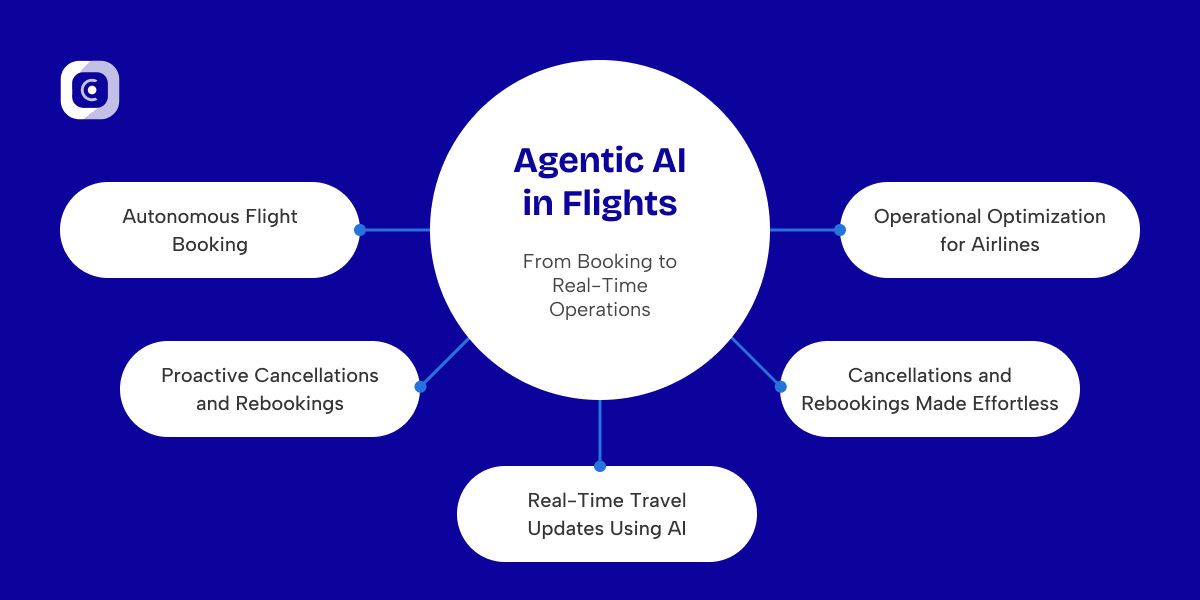
Key Innovations in Flight Operations
- Autonomous Flight Booking:
Agentic AI eliminates the need for travelers to search for flights across and compare multiple booking sites manually. AI systems research real-time information and make autonomous decisions on seat selection, fare comparison, and booking, considering weather and traveler preferences.
For example, a traveler needs to get to Paris within a particular budget and time range. Agentic AI rapidly assesses a variety of options, connecting flights for an efficient and economical solution, and makes a booking within a matter of minutes. - Proactive Cancellations and Re-bookings:
When there is a disruption with weather delays or air traffic issues, Agentic AI in flight operations knows who the affected travelers are, cancels their reservations, and rebooks them on another flight with no need for human interaction. It updates all connected reservations such as hotels, transfers for a seamless experience. - Real-Time Travel Updates Using AI:
Agentic AI provides tailored, contextual, real-time alerts to travelers, spanning from gate changes to baggage tracking. The AI system does not only notify travelers, it also acts autonomously. The system adjusts itineraries and confirms alternative travel arrangements. - Operational Optimization for Airlines:
AI automation in travel makes airline backend operations seamless. Predicting demand and disruptions, agentic systems handle crew scheduling, fuel optimization, and fleet maintenance. This decreases downtime and improves service punctuality and reliability. - Predictive Risk Management:
Autonomous AI agents in tourism help airlines predict possible disruptions in operations such as delays and safety risks by considering items outside the operational sphere like geography, weather, airport traffic, and geopolitical risks.
Basically, Agentic AI in flight operations changes airlines from being just reactive systems to proactive, self-optimizing ecosystems increasing traveler trust, resilience in operations, and profitability.
Agentic AI in Hotels: Redefining Guest Experience and Operational Intelligence
The hotel industry depends heavily on personalization, efficiency, and service excellence all of which agentic AI in hotels provides great value. With the combination of autonomous operations and adaptive learning, hotels can provide advanced booking systems, hassle-free check-ins, and real-time interaction, all while improving the internal processes.
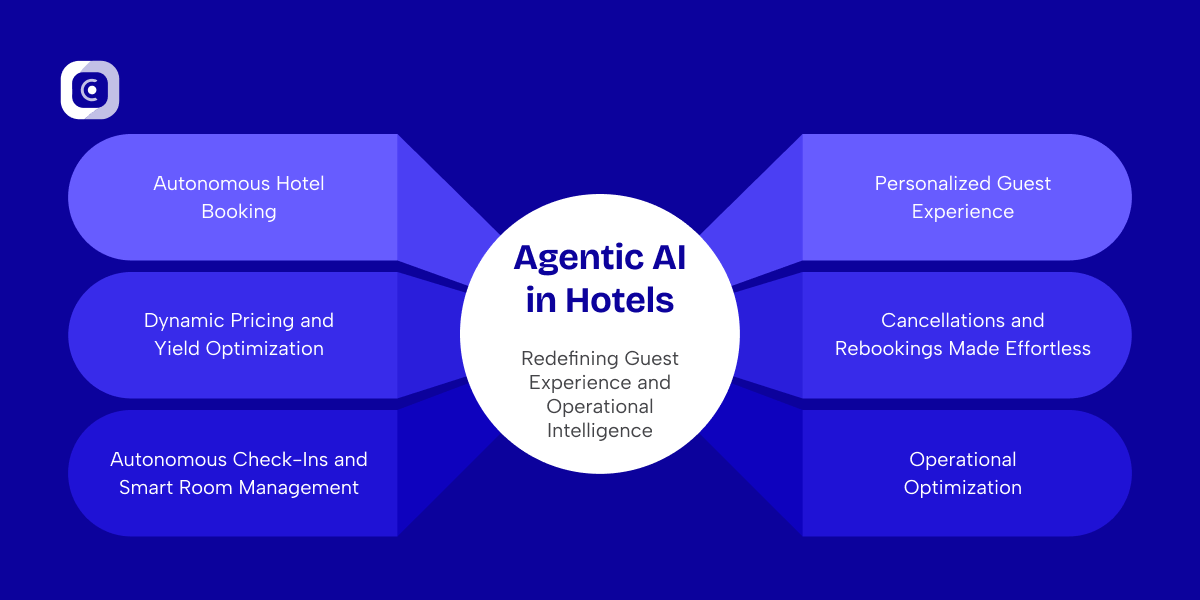
Key Transformations in Hotel Operations
- Autonomous Hotel Booking:
Agentic AI in hotel management analyzes traveler profiles, preferences, and loyalty behavior through advanced data models. It automatically books rooms in consideration of a traveler’s budget, preferred room type, and view preferences. For instance, if a traveler tends to book eco-friendly and ocean-view rooms, the AI will seek out and prioritize these options even if they don’t specify them.
- Dynamic Pricing and Yield Optimization:
The use of AI in travel industry is revolutionizing revenue management. Agentic AI analyzes competitor’s hotel pricing, hotel industry demands, local events, forecasts, and more, to calibrate room pricing in real time. This guarantees the hotel maximizes revenue while hotel prices remain competitive.
- Autonomous Check-Ins and Smart Room Management:
Guests can check-in and have their rooms assigned and digital keys issued in real-time. AI-powered systems check-in guests and issue digital keys. These autonomous AI agents in tourism also handle special requests that guests make, like extra pillows, late check-outs and dinner reservations, without front desk staff needing to manage them.
- Personalized Guest Experience:
Agentic AI for travel planning goes beyond just automation. It learns each time a guest books a stay. It will remember details like a guest’s dietary restrictions or preferred amenities and will modify future stays to meet a guest’s predefined expectations. Returning guests could have their favorite snacks or drinks ready or have other recommendations catered to their liking.
- Making Cancellations or Re-bookings Easy:
If a booking has to be canceled, agentic AI automatically processes refunds, finds alternate dates or partner hotels, and responds to travelers in real time. This end-to-end autonomy guarantees satisfaction and ensures no downtime in hotel operations.
- Operational Optimization:
On the managerial side, AI automation in travel provides predictive staffing and ensures the right number of employees will be available based on forecasted occupancy. It oversees system maintenance, monitors when rooms or equipment need service, and prevents unexpected disruptions.
Through agentic AI in hotel operations, the hospitality sector moves beyond basic digitalization to a fully intelligent ecosystem pre-digitalized toward fully anticipating needs and personalizing experiences while maximizing operational efficiency.
The Future of Autonomous Travel Systems
With agentic AI use cases in the travel sector growing, flights-hotel synergy will be critical to an autonomous travel ecosystem. Imagine a system where:
- An automated flight booking adjusts the hotel reservation check-in time to accommodate for the delays on landing.
- Upon arrival, your AI assistant schedules airport transfers and meal reservations for you.
- Autonomous AI agents handle real-time disruptions in the complex travel system, fully managing the various AI agents, and ensuring no links in the travel chain are overlooked.
This is the next evolution of AI in travel industry, the shift from basic automation to intelligent self-learning AI systems that change how people experience every corner of the world.
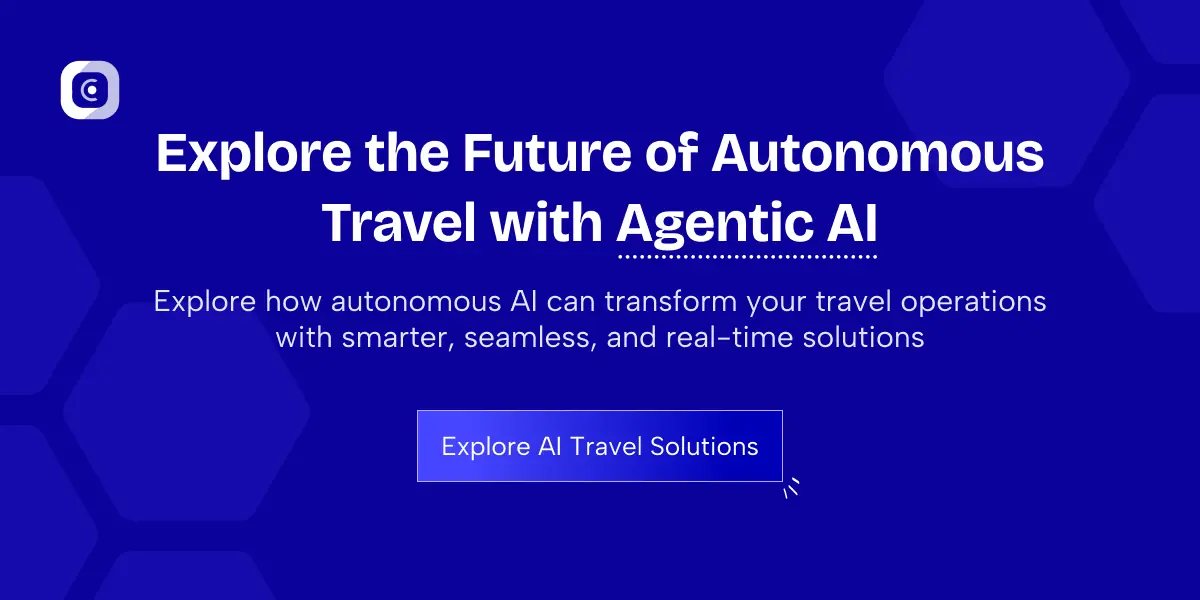
Conclusion
The rise of Agentic AI in travel operations is a game-changer for the travel industry. From autonomous flight booking to personalized travel experiences, this technology is transforming how businesses operate and how travelers engage with the world. By leveraging AI automation in travel and agentic AI for travel planning, the industry is moving toward a future where every aspect of the travel journey is seamlessly orchestrated, reducing friction and enhancing satisfaction. Agentic AI offers the potential to improve efficiency, anticipate disruptions, and provide real-time, personalized experiences. The future of travel is autonomous, and Agentic AI is at the forefront of this evolution.
FAQs
AI automation in travel helps in streamlining bookings, managing prices, responding to customer inquiries, and gives real-time travel updates using AI for better efficiency and user experience.
Agentic AI use cases in the travel industry include autonomous flight booking, personalized hotel recommendations, predictive customer service, and intelligent travel itinerary management.
Agentic AI in hotels enables smart check-ins, dynamic pricing, personalized guest services, and predictive maintenance to enhance operational efficiency and guest satisfaction.


